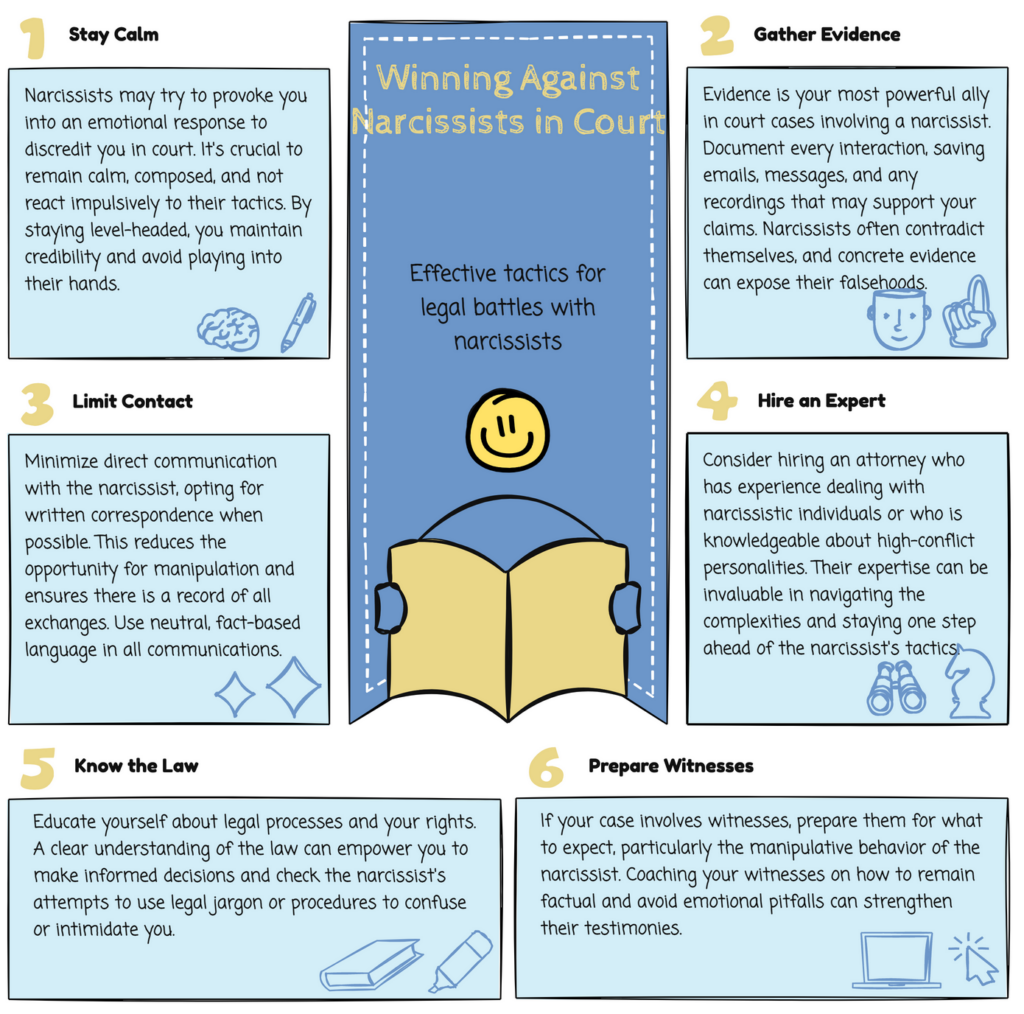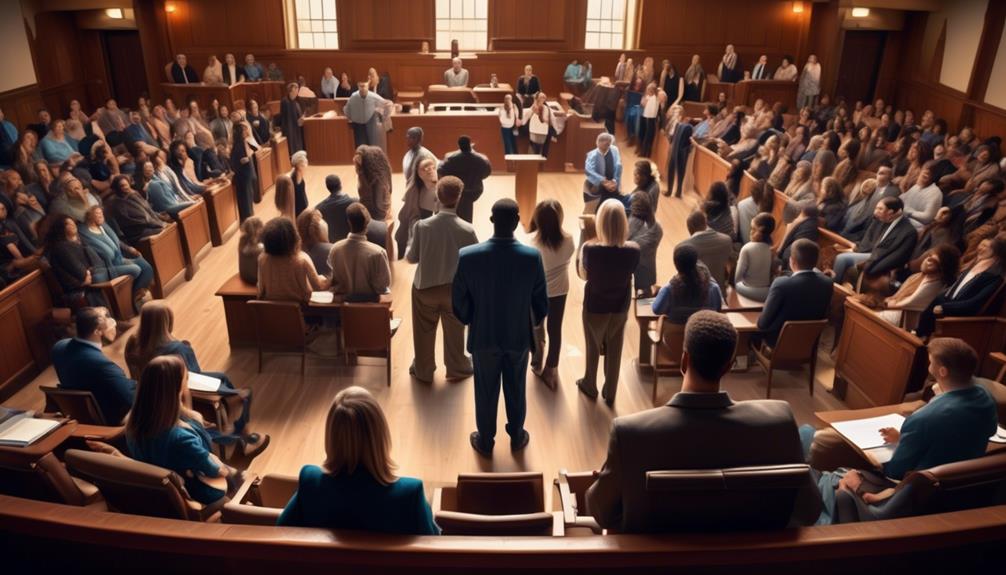Have you ever found yourself caught in a legal battle with a narcissist, feeling trapped in a maze designed to confuse and exhaust you?
The intricate dance of navigating the legal system can be even more challenging when faced with someone who thrives on manipulation and control.

However, there are strategies and approaches that can help level the playing field and protect your rights.
By understanding the dynamics at play, you can arm yourself with knowledge and tools to counter the tactics often employed by narcissists in court.
Understanding Narcissistic Behavior Patterns
Recognizing narcissistic behavior patterns is crucial when preparing to navigate legal proceedings involving individuals with narcissistic personality disorder. Dealing with a narcissist in court requires a deep understanding of their tactics and manipulative tendencies. Narcissists are characterized by an inflated sense of self-importance, a constant need for admiration, and a lack of empathy towards others.
When engaged in a legal battle with a narcissist, it’s essential to keep emotions in check and focus on presenting factual evidence. Emotional reactions and false accusations are common strategies employed by narcissists to gain control over the situation. It’s vital to anticipate these tactics and prepare accordingly.
Seeking support from professionals who are well-versed in dealing with narcissism can provide guidance and assistance in navigating the complexities of court proceedings. By documenting instances of manipulative or abusive behavior by the narcissist, one can build a strong case to present in court.
Maintaining clear boundaries and staying persistent in the face of manipulation are key strategies when dealing with a narcissist in a legal setting.
Strategies for Courtroom Success

Understanding narcissistic behavior patterns is crucial when preparing to navigate legal proceedings involving individuals with narcissistic personality disorder.
When it comes to achieving success in the courtroom against a narcissist, maintaining a calm and composed demeanor is key to countering their manipulative tactics.
In dealing with a narcissist in court, it’s vital to focus on presenting factual evidence rather than getting entangled in emotional debates.
Consulting with a qualified attorney experienced in handling narcissistic personalities can provide valuable insight and strategic guidance.
Building a strong support network of trustworthy individuals who can offer testimonials or evidence to bolster your case is essential in a custody battle or family court setting.
Be prepared for attempts by the narcissist to discredit you, and have a well-thought-out plan to counter any false accusations effectively.
Documenting incidents and interactions, gathering evidence of harmful behavior, and seeking support from mental health professionals can all contribute to a successful outcome when facing a narcissist in court.
Building a Strong Legal Case
To construct a compelling legal case against a narcissist, it is imperative to maintain a steadfast focus on factual evidence and strategic presentation. When dealing with individuals who exhibit narcissistic behavior due to Narcissistic Personality Disorder (NPD), building a robust legal strategy becomes paramount. In a custody case or dispute involving a narcissistic relationship, presenting solid evidence of narcissistic abuse is crucial. Working closely with experienced family lawyers can be a good idea to navigate the complexities of such cases successfully.
To help illustrate the importance of building a strong legal case, consider the following table:
| Key Actions | Importance |
|---|---|
| Keep records | Documenting instances of narcissistic behavior is vital |
| Gather solid evidence | Evidence is essential to support your claims |
| Seek expert advice | Guidance from skilled attorneys can be invaluable |
| Utilize witnesses | Witness testimony can strengthen your case |
| Maintain clear communication | Clarity with your lawyer aids in effective representation |
Leveraging Support Systems

Engaging with a reliable support network is crucial when navigating the complexities of dealing with a narcissist in a legal setting.
When divorcing a narcissist or facing them in court, leveraging support systems can be a game-changer. Support groups, friends, and family members can offer emotional support and guidance, helping you stay grounded amidst the chaos of court battles.
In family law cases, especially custody battles, having a strong support system can provide practical assistance and a sounding board for strategic decisions. Additionally, collaborating with professionals who understand narcissistic personality traits, such as lawyers or mental health experts, can bolster your case in court.
By documenting the narcissist’s manipulative behaviors and maintaining a focus on truth and credibility, you can counter false claims effectively.
Post-Trial Recovery and Healing
In the aftermath of the trial, our focus shifts towards our journey of recovery and healing from the emotional turmoil inflicted by the narcissist. The battle against a narcissist in court can leave deep scars, especially in cases involving domestic violence, shared children, and constant need for control.
Post-trial recovery and healing become a key part of reclaiming one’s mental well-being. It’s essential to acknowledge the impact of the ordeal on mental health, as dealing with individuals with narcissistic traits might bring about significant distress. Seeking therapy or counseling can aid in processing the trauma and manipulation experienced during the legal proceedings.
Building a strong support system with friends and family who understand the complexities of dealing with narcissistic personalities is crucial. Engaging in self-care practices and setting boundaries to limit further exposure to the narcissist’s harmful influence are vital steps towards recovery.
Frequently Asked Questions
How Do You Trigger Narcissistic Rage in Court?
When dealing with a narcissist in court, triggering their rage isn’t a recommended strategy. Instead, our focus should be on presenting facts and evidence calmly and confidently.
Maintaining clear boundaries, seeking support from professionals, and working with an experienced attorney are key steps.
Our goal is to navigate the legal process effectively and protect our rights without engaging in tactics that may escalate the situation.
How Do You Win a Battle With a Narcissist?
We can navigate a battle with a narcissist by focusing on presenting solid evidence and maintaining composure. By staying calm and collected, we can avoid falling into emotional traps set by the narcissist.
It’s crucial to anticipate their tactics, such as gaslighting, and have counterarguments prepared. Keeping detailed records of interactions with the narcissist is essential for refuting false claims.
Seeking support from professionals can help us cope with the emotional challenges.
How Do You Expose Narcissistic Abuse in Court?
When exposing narcissistic abuse in court, we focus on presenting concrete evidence and maintaining a composed demeanor. Utilizing objective witnesses and consulting with a knowledgeable attorney are crucial.
Documenting instances of abuse and demonstrating steps taken to protect those affected are key. We must show a strong support system to counter any attempts to discredit us.
Maintaining composure and not engaging in manipulative tactics are essential strategies in these situations.
How to Win a Custody Case With a Narcissist?
To win a custody case with a narcissist, we focus on presenting factual evidence, keeping detailed records, utilizing expert witnesses, and maintaining a composed demeanor in court.
Seeking support from a qualified family lawyer is crucial. Collecting evidence of harmful behaviors, documenting manipulation attempts, emphasizing a stable home environment for the children, and building a strong support network are key strategies.
Presenting a comprehensive parenting plan is essential to showcase our proposed custody arrangements.
Conclusion
In conclusion, by understanding the tactics and behavior of a narcissist, utilizing effective strategies in court, and building a strong legal case, it’s possible to beat a narcissist in court.
Leveraging support systems and focusing on post-trial recovery and healing are also crucial aspects of this process.
It’s important to prioritize your mental health and seek professional help to navigate the challenges that may arise during this legal battle.
Additionally, documenting evidence is essential to protect yourself and your children from the manipulative tactics of a narcissist.
With determination and the right support, justice can be served.









